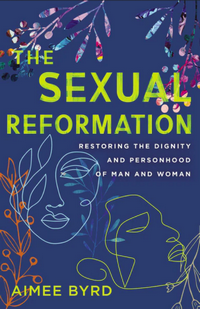 The Sexual Reformation:
The Sexual Reformation:
Restoring the Dignity and
Personhood of Man and Woman
by Aimee Byrd
DETAILS: Publisher: Zondervan Publication Date: March 7, 2022 Format: Paperback Length: 207 pg. Read Date: January 1-15, 2023

The Back of the Book
Protestants have confessed that the church is always reforming.
But has this been the case when it comes to sexuality?
What if, in trying to be faithful to the beauty of God’s design for man and woman, the church has instead latched onto a pagan concept of our nature and missed the theological meaning of our sexes? We’ve inadvertently robbed both men and women of the dignity of personhood as created in the image of God. Then we miss the beautiful message that our bodies, and our whole selves as men and women, tell: the story of the great joy in which the Son received the gift of his bride, the church.
Through an exploration of the Song of Songs, Aimee Byrd examines what this often-ignored book can teach us about Christ, his church, man, and woman. The Church is ripe for a sexual reformation, and recovering a good theological footing is imperative to it. Byrd invites you to enter into the Song’s treasures as its lyrics reveal the point of it all—not a list of roles and hierarchy, but a love song.
The Song
Like many (most?) contemporary believers, I struggle with The Song of Songs. A lot of the allegorical interpretations seem a little off to me, but I can’t rule them out. I definitely can’t buy the idea that it’s simply an erotic poem and/or erotic manual smack in the middle of the Old Testament.
Byrd draws on both older allegorical interpretations and more recent versions—shaped by the insights of Biblical Theology to come up with her observations on the Song. I found this material fascinating and wanted much more of it. I really should grab some of the works she footnoted and study them.
Call to Reformation
Along with—intermixed with—the Song material is Byrd’s continuing work on re-evaluating the way that men and women relate to themselves in the Protestant Church—particularly the ways that groups like the Council on Biblical Manhood and Womanhood or the Council on Biblical Equality call for. She critiques both poles of these disputed ideas (although she seems to have more to say about CBMW).
Her goal for the book is to bring insights from the Song to the ideas of roles, relations, and treatment of people of both genders—but primarily for women, because that’s where most of the controversy lies.
Her contention is that as we better understand the Song, we’ll better understand the telos of both sexes, which will lead to better—and more harmonious—relations between all the members of the church.
So, what did I think about The Sexual Reformation?
If this book was only the material (expanded) on the Song of Songs, I think I’d really have enjoyed it. If the book was only the other materials, it’d have been thought-provoking—and maybe convincing. But the mix of the two…ehhhhh. I’m not sure. It felt like two half-books that didn’t necessarily belong together. If one (or both) of them got a chance to be fully baked, that’d have been so much better.
Historically, the interpretation of the Song is so varied that it can easily be seen as a wax nose that can be used to say whatever an author wants. I’m not saying that Byrd did that. But I can see where it could be seen that way—yet another reason for the two books to be split.
It’s an accessible read, relatable, and the issues it wants to focus on are very important for believers to wrestle with. Making this the kind of book we need more of (both those that agree with her and those who differ, so we can think about these things). Although we got a little more about what’s going on with Byrd personally than the book really needed, and a lot of the sexual reformation material is a reiteration of her last couple of books, just presented through a different prism.
Ultimately, the Song gives me enough trouble that I’m not really sure what I think of what she says—but I liked it and want to read more like it to see it better. I’m generally on-board with her reformation ideas in broad strokes. So, I’ve got every reason to like this book, but I’m not wholly sold.
Still, I recommend the book for those who want to wrestle with these ideas—or to get pushed on the content of the Song.

This post contains an affiliate link. If you purchase from it, I will get a small commission at no additional cost to you. As always, the opinions expressed are my own.
![]()





